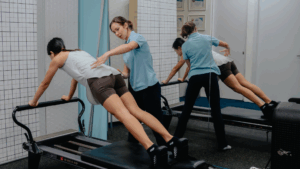Time to dive into the realms of tension headaches. If you’ve ever found yourself grappling with the steady, squeezing ache around your head, you’re in the right place. Tension headaches, though common, hold a certain mystique that we aim to unravel. In the upcoming paragraphs, we’ll navigate through the intricacies of their symptoms, identify the key tension points, and delve into the myriad of causes contributing to their presence. From stress-induced tightening to the impact of poor posture, we’ll dissect the puzzle, offering insights and strategies to not only alleviate the discomfort but to understand and ultimately liberate ourselves from the grasp of tension headaches.
What is a tension headache?

In essence, a tension headache is characterised by mild to moderate pain that feels like a band squeezing your head. Unlike migraines, tension headaches don’t typically come with the throbbing intensity or nausea, but they can be a constant companion, lingering for hours or even days.
What are the symptoms of tension headaches?
Tension headaches are often characterised by a set of distinct symptoms that collectively contribute to their identification. Understanding these symptoms is crucial in differentiating tension headaches from other types of headaches and seeking appropriate relief. Here’s a closer look at the key indicators:
- Dull, squeezing pain: The hallmark of tension headaches is a persistent, mild to moderate pain that feels like a tight band or pressure around the head. This sensation is usually bilateral, affecting both sides of the head.
- Duration of pain: Unlike some other types of headaches, tension headaches tend to linger for an extended period. They can last from 30 minutes to several days, becoming a persistent companion during stressful or challenging times.
- Tenderness in scalp, neck, and shoulders: Individuals experiencing tension headaches often report tenderness or sensitivity in the muscles of the scalp, neck, and shoulders. These areas may feel tight or sore to the touch.
- Gradual onset: Tension headaches typically develop gradually rather than suddenly. The pain may start mild and intensify over time, making it easier for individuals to dismiss the initial discomfort.
- No aura or nausea: Unlike migraines, tension headaches usually do not come with auras – visual disturbances that precede the headache. Additionally, nausea or vomiting is not a common symptom of tension headaches.
- Sensitivity to light and noise: While not as pronounced as with migraines, some individuals with tension headaches may experience sensitivity to light (photophobia) or noise (phonophobia). This sensitivity can contribute to the overall discomfort associated with the headache.
- Regular, recurrent episodes: Tension headaches often follow a pattern of recurrence. Individuals may experience them episodically, with periods of headache-free intervals, or chronically, where the headaches are a consistent presence.
- Exacerbation during stress: Stress is a common trigger for tension headaches. Individuals may notice that the pain intensifies during periods of increased stress, whether due to work, personal issues, or other external factors.
Recognising these symptoms can empower individuals to seek timely and targeted relief for tension headaches. Whether through lifestyle adjustments, stress management, or professional interventions like physiotherapy, understanding the nuances of tension headache symptoms is a crucial step towards effective management and prevention.
When it comes to physiotherapy, our experienced practitioners can guide you in your first step to improving your wellbeing and headaches. Book a session with us today!
Where are the tension headache points?

Tension headaches are not randomly scattered; they tend to concentrate in specific areas. The pain often radiates from the neck and the base of the skull, extending to the forehead. The muscles of the scalp, neck, and shoulders are key players in tension headaches, and it’s not uncommon to feel a tightness or tenderness in these regions.
Understanding these headache points is instrumental in both prevention and management. Targeted relief measures can work wonders when applied to these areas. This can be done through a session with our experienced physiotherapists and osteopaths where they will perform certain techniques to relieve these headaches.
What are the causes of tension headaches?
Unravelling the mystery behind tension headaches involves navigating through a complex interplay of various factors. While the exact mechanisms are not fully understood, several common triggers and contributors have been identified. By understanding these causes, individuals can take proactive steps towards managing and preventing tension headaches. Let’s delve into the key factors:
- Stress and anxiety: Perhaps the most notorious culprit, stress is a leading cause of tension headaches. When the body is under stress, it often responds with muscle tension, particularly in the neck and shoulders. This tension can gradually build up, triggering a headache.
- Poor posture: In the age of technology, prolonged periods spent hunched over computers and mobile devices can contribute to poor posture. Incorrect ergonomics and slouching can strain the muscles of the head and neck, setting the stage for tension headaches.
- Muscle tension and contraction: The name ‘tension headache’ itself implies a role for muscle tension. The muscles of the scalp, neck, and shoulders can contract and tighten, leading to the characteristic band-like sensation around the head.
- Dehydration: Inadequate fluid intake can result in dehydration, which may contribute to tension headaches. Dehydrated muscles are more prone to tightening and cramping, exacerbating headache symptoms.
- Lack of sleep: Insufficient or poor-quality sleep is a known trigger for tension headaches. The body relies on adequate rest to repair and rejuvenate, and disruptions in sleep patterns can lead to increased muscle tension and headache occurrence.
- Skipping meals: Irregular eating patterns, particularly skipping meals, can lead to fluctuations in blood sugar levels. This, in turn, can trigger headaches. Maintaining a consistent and balanced diet is crucial in preventing tension headaches related to blood sugar imbalances.
- Eyestrain: Prolonged periods of intense focus, such as staring at screens for extended durations, can strain the eyes and contribute to tension headaches. Taking regular breaks and practising eye exercises can help alleviate this strain.
- Caffeine withdrawal: For those accustomed to a regular intake of caffeine, sudden withdrawal or a significant reduction in consumption can lead to headaches, including tension headaches. Gradual reduction and maintaining a consistent caffeine intake can help mitigate this trigger.
- Environmental factors: Certain environmental factors, such as loud noises, bright lights, or strong odours, can contribute to tension headaches, especially in individuals sensitive to sensory stimuli.
- Jaw clenching and teeth grinding: Habits like clenching the jaw or grinding teeth, especially during sleep, can contribute to muscle tension in the head and neck, triggering tension headaches. Additionally, this is often associated with Temporomandibular Joint (TMJ) Disorders, commonly referred to as TMD. The intricate network of nerves in the face, head, and neck region can be affected by the dysfunction of the temporomandibular joint. This can result in tingling sensations that may be felt in the head.
Understanding these underlying causes empowers individuals to adopt targeted strategies for headache prevention. Lifestyle modifications, stress management techniques, and professional interventions such as physiotherapy at our clinic can play pivotal roles in breaking the cycle of tension headaches and promoting overall well-being.
How to relieve tension headaches?
How can you find relief from tension headaches? There are various strategies that can help alleviate the discomfort and, in some cases, prevent the headaches from recurring.
How does physiotherapy alleviate tension headaches?

Here at City Osteopathy and Physiotherapy, our physiotherapists use a systematic series of techniques aimed to identify the specific upper neck spinal segment (C1-3) responsible for the headache and migraine symptoms. Through this process, we aim to achieve confirmation by reproducing the typical head pain and then sustain the technique for 45 seconds, leading to complete resolution.
This proactive approach not only addresses the symptoms but also works towards preventing the recurrence of tension headaches. It’s like giving your muscles a well-deserved tune-up, helping you break free from the cycle of persistent headaches.
Why should I seek help from physiotherapists to alleviate tension headaches?
Physiotherapists provide targeted relief for tension headaches by addressing muscle imbalances, enhancing posture, and offering tailored exercises. If you’re finding that medication is no longer effective in managing your head pain, and your headaches or migraines are worsening, it’s time to consider an alternative solution.
Our physiotherapists at City Osteopathy and Physiotherapy aim not only to alleviate existing discomfort but also to prevent the recurrence of tension headaches through gentle techniques that don’t involve cracking your neck, ensuring a comfortable experience.
What are the types of headaches physiotherapists can treat?

Our dedicated team of physiotherapists employs a meticulous approach to headache management that begins with a thorough identification of the specific type of headache a patient may be experiencing.
Understanding that headaches can stem from various root causes, our experts conduct comprehensive assessments, taking into account factors such as posture, muscle tension, and overall musculoskeletal alignment. This diagnostic precision allows us to differentiate between the different types of headaches, enabling us to tailor a targeted treatment plan that addresses the underlying issues unique to each patient. Here are a few of the common headaches that we treat:
Chronic daily headache
Characterised by persistent daily headaches, often without specific triggers, chronic daily headaches can impact one’s quality of life. Physiotherapists employ a multifaceted approach, addressing contributing factors such as muscle tension, posture, and stress.
Cervicogenic headache
Originating from the neck, cervicogenic headaches stem from structural issues or dysfunction in the cervical spine. Physiotherapists focus on addressing underlying musculoskeletal issues to alleviate pain and improve neck function.
Cluster headache
Known for their intensity and recurring patterns, cluster headaches can be debilitating. Physiotherapists work on muscular and postural elements to reduce tension and may incorporate relaxation techniques to manage these intense episodes.
Whiplash headache
Following neck trauma, whiplash headaches can arise. Physiotherapists play a vital role in the rehabilitation process, targeting muscle imbalances, restoring neck mobility, and alleviating associated headaches.
Sinus headache
Often mistaken for migraines, sinus headaches result from inflammation in the sinus passages. Physiotherapists focus on relieving tension in the head and neck, complementing medical interventions to manage sinus-related discomfort.
Cyclical vomiting syndrome
While the exact cause is unclear, physiotherapists can provide supportive care for individuals experiencing headaches associated with cyclical vomiting syndrome, addressing musculoskeletal aspects and promoting overall well-being.
Occipital neuralgia
Involving the irritation of the occipital nerves, this condition leads to sharp, shooting pains in the head. Physiotherapists employ techniques to relieve nerve compression and alleviate the associated headache symptoms.
Trigeminal neuralgia
Characterised by intense facial pain, trigeminal neuralgia can have associated headaches. Physiotherapists focus on addressing musculoskeletal factors that may contribute to the overall discomfort associated with this condition.
What are the types of migraines physiotherapists can treat?
In the realm of healthcare, physiotherapy emerges as a versatile discipline with the remarkable ability to address not only the commonplace discomfort of headaches but also the more debilitating challenge of migraines. Here are some examples of the migraines our physiotherapists address:
Chronic migraine
Frequent and debilitating, chronic migraines can significantly impact daily life. Physiotherapists work on various fronts, including muscle tension, posture correction, and lifestyle adjustments, to reduce the frequency and intensity of chronic migraines.
Menstrual migraine
Linked to hormonal changes, menstrual migraines can be challenging. Physiotherapists offer strategies to manage the musculoskeletal components, providing relief and potentially reducing the impact of hormonal fluctuations.
Migraine with or without aura
Physiotherapists address the muscular and postural aspects associated with migraines, whether they come with or without aura. Their interventions aim to reduce the frequency and severity of these often-disruptive headaches.
Vestibular migraine
Involving dizziness and balance issues, vestibular migraines can be complex. Physiotherapists work on enhancing vestibular function and addressing contributing musculoskeletal factors to alleviate symptoms.
Hemiplegic migraine
Characterised by temporary paralysis or weakness on one side of the body, hemiplegic migraines require a comprehensive approach. Physiotherapists contribute by addressing musculoskeletal factors and promoting overall well-being in collaboration with medical management.
Easing the grip of tension headaches

Understanding tension headaches involves recognising their symptoms, pinpointing their origins, and adopting effective strategies for relief. Take charge of your wellbeing and book a session with our physiotherapists or osteopaths for relief. Remember, breaking free from tension headaches is not just about managing the pain; it’s about reclaiming a life unburdened by the constant squeeze of tension.
FAQs
Why are tension headaches so persistent?
Tension headaches can be persistent due to a combination of lifestyle factors. Stress, poor posture, and inadequate self-care can contribute to the continuous cycle of tension. Breaking free from this persistence often requires a multi-faceted approach, including stress management, lifestyle adjustments, and, in some cases, professional intervention.
Does tension headache lead to sinus infections?
Contrary to popular belief, tension headaches and sinus infections are distinct entities. Tension headaches result from muscle tension and stress, while sinus infections involve inflammation of the sinus cavities. However, it’s not uncommon for individuals to mistake tension headaches for sinus headaches due to overlapping symptoms. Seeking professional guidance can help differentiate between the two and ensure the appropriate course of action. If you’re looking for relief and guidance, our experienced physiotherapists and osteopaths are able to target specific areas to pinpoint the pain you’re experiencing.
Can wisdom teeth cause tension headaches?
Surprisingly, the answer is yes. Wisdom teeth, or the lack thereof, can contribute to tension headaches. Impacted wisdom teeth or the shifting of teeth can affect the bite, leading to muscle tension and headaches. If you suspect that your wisdom teeth might be a contributing factor, consult with expert dentists to explore potential solutions.










